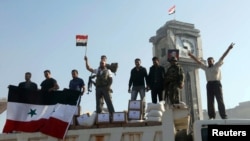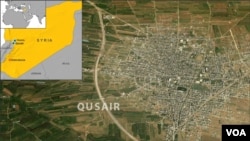BEIRUT —
Now that Syrian government troops and Hezbollah guerrillas have captured the strategic border town of Qusair from anti-government rebels, military experts and diplomats say there will almost certainly be a renewed government-led offensive on the northern city of Aleppo.
The rebels had held Qusair for more than a year in their overall struggle to topple the government of President Bashar al-Assad. Its loss to government forces represented a major blow to rebels, whose most effective fighting units, the al-Qaida-linked al-Nusra front, were defending the town.
Qusair, once a town of between 30,000 and 40,000 people, is 17 kilometers inside Syria on the main highway leading into Lebanon’s Bekaa Valley and on to Beirut. In the final days of fighting for the town, more than 2,000 Hezbollah fighters from the militant Lebanese Shia movement were re-directed to Aleppo instead of being sent to strengthen the assault on Qusair.
“We will continue our string of victories until we regain every inch of Syrian land,” the Syrian military command said in announcing Qusair’s capture.
The two-week-long battle for Qusair involved government air strikes, artillery bombardments and close-quarter fighting. It finally fell with an overnight Hezbollah ground assault that opened the way for Syrian government tanks to penetrate the north-side of the town where last rebels were holding out.
Hezbollah's al-Manar television channel in Beirut showed a fighter scaling a pockmarked clock tower in Qusair’s ruined central square to hoist a Syrian flag.
Hezbollah suffers heavy casualties
Hezbollah’s supporters in the Bekaa Valley greeted the image with relief. In recent weeks, the death toll of Hezbollah fighter had mounted, with a crescendo of “martyrdom” announcements on Hezbollah Facebook pages and websites.
There was even rare questioning of the movement’s leadership. Some families who had lost relatives in the battle even questioned the need for the Lebanese militia’s involvement in Syria.
But in Hezbollah-dominated southern Beirut, the movement’s supporters celebrated Qusair’s fall with with gunfire and fireworks.
The victory marked a significant Hezbollah victory over Jabhat al-Nusra, which had taken the lead in defending Qusair and which had sent in reinforcements from the eastern town of Raqaa.
In the propaganda battle, Sunni jihadists had claimed that Hezbollah fighters are more adept at the defensive tactics they learned from protecting Lebanese Shia villages. The Lebanese guerrillas were not so adept at offensive military operations, they said.
First full-scale Hezbollah-al-Nusra battle
But the retaking of Qusair, the first full-scale fight between Hezbollah and Al Nusra, went a little way in undermining that claim, according to a European military attaché based in Beirut.
“It is true that the rebels were outgunned, and they had to cope with heavy rocket attacks and air strikes, but Hezbollah acquitted itself well in Qusair, especially when they took over the fighting from the Syrian army – something the Israeli military will be studying.”
The retaking of Qusair will make life much more difficult for the rebels in central Syria. The town was important for the rebels’ logistics and supply routes from Lebanon. With Qusair back in government hands, the Assad regime now has a clear corridor stretching from Damascus to the coastal strongholds of his minority Alawite sect, an offshoot of Shia Islam.
"Whoever controls Qusair controls the center of the country, and whoever controls the center of the country controls all of Syria," Syrian Brigadier General Yahya Suleiman said on Beirut-based Mayadeen television.
Qusair’s loss to the rebels can also be measured in terms of morale. Rebel leaders blamed the setback on being outgunned, arguing that they could have held on if they had been better equipped by their foreign backers in Saudi Arabia and Qatar, and if the West wasn’t blocking them from receiving shoulder-launched anti-aircraft missiles.
In a statement, the rebels said they had to withdraw “in the face of this huge arsenal and lack supplies and the blatant intervention of Hezbollah.”
Rebel weaknesses exposed
Certainly the rebels could not match the massive firepower that the Syrian government brought to bear. Nonetheless, “at least seven rebel groups from across the country provided hundreds of reinforcements,” said Charles Lister, an analyst, at IHS Jane’s terrorism and insurgency center.
The loss of Qusair further exposes the lack of coordination between the various rebel groups and the absence of a firm command-and-control structure to the rebellion -- faults that have dogged the rebellion since its start more than two years ago.
In recent weeks, rebel disarray has allowed the Assad government to solidify recent gains on the ground – that in turn has tilted the military struggle in Assad’s favor.
Lister said he believes the rebels will “suffer from a loss of morale.” But “a seemingly imminent military offensive on Aleppo city may provide an invaluable distraction.”
So too might mounting reprisal attacks on Shia towns in eastern Lebanon. Before the fall of Qusair, General Selim Idriss, the military leader of the main rebel umbrella group, the Free Syrian Army, warned that his fighters were prepared to take the conflict inside Lebanon in pursuit of Hezbollah fighters. The Hezbollah fighters, he said, were “invading” Syria and Lebanon was doing nothing to stop them.
Qusair also is likely to impact the Obama administration and its efforts to get peace talks underway in Geneva.
U.S. and Russian officials met in Switzerland on Wednesday in an attempt to set the date for a peace conference. But who will attend, and when, still remains unclear. The rebel themselves are not sure they will attend such a conference.
Lakhdar Brahimi, the U.N. and Arab League envoy to Syria, now says peace talks are unlikely to be held before July, adding that the lack of agreement on a date is “embarrassing.”
The rebels had held Qusair for more than a year in their overall struggle to topple the government of President Bashar al-Assad. Its loss to government forces represented a major blow to rebels, whose most effective fighting units, the al-Qaida-linked al-Nusra front, were defending the town.
Qusair, once a town of between 30,000 and 40,000 people, is 17 kilometers inside Syria on the main highway leading into Lebanon’s Bekaa Valley and on to Beirut. In the final days of fighting for the town, more than 2,000 Hezbollah fighters from the militant Lebanese Shia movement were re-directed to Aleppo instead of being sent to strengthen the assault on Qusair.
“We will continue our string of victories until we regain every inch of Syrian land,” the Syrian military command said in announcing Qusair’s capture.
The two-week-long battle for Qusair involved government air strikes, artillery bombardments and close-quarter fighting. It finally fell with an overnight Hezbollah ground assault that opened the way for Syrian government tanks to penetrate the north-side of the town where last rebels were holding out.
Hezbollah's al-Manar television channel in Beirut showed a fighter scaling a pockmarked clock tower in Qusair’s ruined central square to hoist a Syrian flag.
Hezbollah suffers heavy casualties
Hezbollah’s supporters in the Bekaa Valley greeted the image with relief. In recent weeks, the death toll of Hezbollah fighter had mounted, with a crescendo of “martyrdom” announcements on Hezbollah Facebook pages and websites.
There was even rare questioning of the movement’s leadership. Some families who had lost relatives in the battle even questioned the need for the Lebanese militia’s involvement in Syria.
But in Hezbollah-dominated southern Beirut, the movement’s supporters celebrated Qusair’s fall with with gunfire and fireworks.
The victory marked a significant Hezbollah victory over Jabhat al-Nusra, which had taken the lead in defending Qusair and which had sent in reinforcements from the eastern town of Raqaa.
In the propaganda battle, Sunni jihadists had claimed that Hezbollah fighters are more adept at the defensive tactics they learned from protecting Lebanese Shia villages. The Lebanese guerrillas were not so adept at offensive military operations, they said.
First full-scale Hezbollah-al-Nusra battle
But the retaking of Qusair, the first full-scale fight between Hezbollah and Al Nusra, went a little way in undermining that claim, according to a European military attaché based in Beirut.
“It is true that the rebels were outgunned, and they had to cope with heavy rocket attacks and air strikes, but Hezbollah acquitted itself well in Qusair, especially when they took over the fighting from the Syrian army – something the Israeli military will be studying.”
The retaking of Qusair will make life much more difficult for the rebels in central Syria. The town was important for the rebels’ logistics and supply routes from Lebanon. With Qusair back in government hands, the Assad regime now has a clear corridor stretching from Damascus to the coastal strongholds of his minority Alawite sect, an offshoot of Shia Islam.
"Whoever controls Qusair controls the center of the country, and whoever controls the center of the country controls all of Syria," Syrian Brigadier General Yahya Suleiman said on Beirut-based Mayadeen television.
Qusair’s loss to the rebels can also be measured in terms of morale. Rebel leaders blamed the setback on being outgunned, arguing that they could have held on if they had been better equipped by their foreign backers in Saudi Arabia and Qatar, and if the West wasn’t blocking them from receiving shoulder-launched anti-aircraft missiles.
In a statement, the rebels said they had to withdraw “in the face of this huge arsenal and lack supplies and the blatant intervention of Hezbollah.”
Rebel weaknesses exposed
Certainly the rebels could not match the massive firepower that the Syrian government brought to bear. Nonetheless, “at least seven rebel groups from across the country provided hundreds of reinforcements,” said Charles Lister, an analyst, at IHS Jane’s terrorism and insurgency center.
The loss of Qusair further exposes the lack of coordination between the various rebel groups and the absence of a firm command-and-control structure to the rebellion -- faults that have dogged the rebellion since its start more than two years ago.
In recent weeks, rebel disarray has allowed the Assad government to solidify recent gains on the ground – that in turn has tilted the military struggle in Assad’s favor.
Lister said he believes the rebels will “suffer from a loss of morale.” But “a seemingly imminent military offensive on Aleppo city may provide an invaluable distraction.”
So too might mounting reprisal attacks on Shia towns in eastern Lebanon. Before the fall of Qusair, General Selim Idriss, the military leader of the main rebel umbrella group, the Free Syrian Army, warned that his fighters were prepared to take the conflict inside Lebanon in pursuit of Hezbollah fighters. The Hezbollah fighters, he said, were “invading” Syria and Lebanon was doing nothing to stop them.
Qusair also is likely to impact the Obama administration and its efforts to get peace talks underway in Geneva.
U.S. and Russian officials met in Switzerland on Wednesday in an attempt to set the date for a peace conference. But who will attend, and when, still remains unclear. The rebel themselves are not sure they will attend such a conference.
Lakhdar Brahimi, the U.N. and Arab League envoy to Syria, now says peace talks are unlikely to be held before July, adding that the lack of agreement on a date is “embarrassing.”





